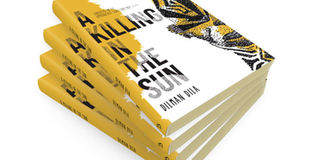A fantasy of entertainment and knowledge

What you need to know:
It’s on sale at Aristoc at Ushs40,000.Can also be bought online at Amazon.com at $15 (about Shs40,000
Book: A Killing in The Sun
Writers: Dilman Dila
A Killing in the Sun is a treat for readers and ambitious learners. Dilman Dila, who mentioned that he grew up with folk stories around him in Tororo, the melting district of tribes, says it is while there that the fusion of folktales shaped his formative storytelling ability.
Just like his collection, there are many stories of fantasy, which many readers will find a novelty. The title story, for example, A Killing in The Sun, the protagonist Mande awaits execution and yet the real conflict is an internal one where all he needs is a priest to reconcile himself with the next world. The entire trial, whose plot lies outside the actual death and into the surreal state of Mande’s mind is what is more fascinating about the story.
Questions of death and religious affectations emerge with the insistent request for a priest, whose absence in the story gives the character of Mande a magnetic appeal. The story, based on the execution of two soldiers in Karamoja, who allegedly killed a priest, reflects the need for writers to continue documenting our important histories. This story was shortlisted for the 2013 Commonwealth Short Story Competition.
The Leafy Man begins in a familiar landscape, with characters a reader finds relatable. The conflict of a starving two-year-old boy, ironically, under an orange grove. The misplacement of starvation in a fruit field creates immediate interest.
There are constant ironies and bizarre situations in the story, where Dila again, proves his ability in science fiction. The plot’s fantastical element is in the various abilities of common illnesses, their trajectories to healing and the personalities of the disease-carrying insects.
The diseases take on their own personalities and the healing processes are perfect in their traditional forms. It is after an intervention from the wider corporate world that the indigenous spaces are narrowed, belittled and here a reader interacts with the deeper layers of capitalism and super-impositions.
Ivor Hartman, editor of African Roar, says the book will keep you riveted from the first page to the last and that it is the fresh air international and local readers have been waiting for.




